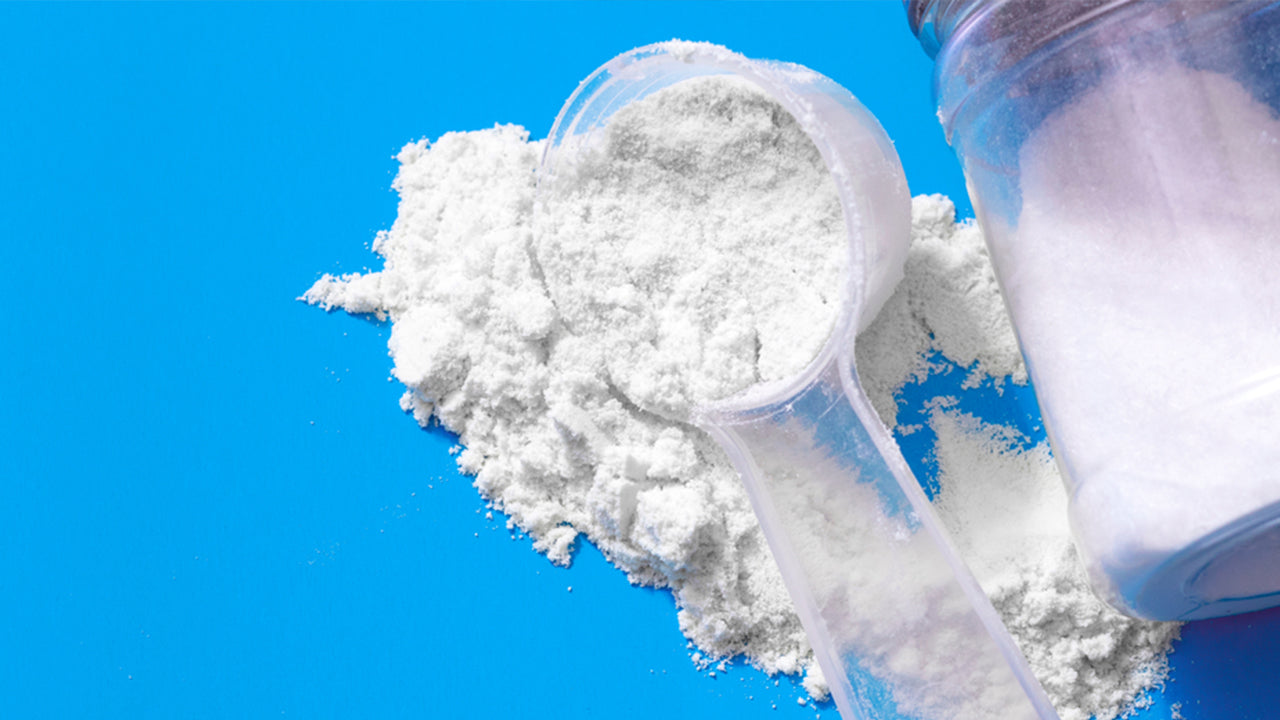When to Take BCAAs: Pre- or Post- Workout? Morning, Noon or Night?
 By: by Amino Science
By: by Amino Science

There are many reasons to take protein supplements, and not all of them have to do with working out. Vegetarians and vegans often take them to make sure they're getting enough plant-based protein. Those recovering from surgery are often on doctor's orders to consume more protein to help heal faster. Those working to lose weight also find that consuming more protein helps fuel their energy and their weight-loss efforts by curbing hunger and increasing muscle growth. All of the above is even more true for those who consume protein like whey, creatine, or BCAAs (branched-chain amino acids) to boost their workout or to build muscle: you need enough protein to function, you need even more protein for recovery, and you need to control your calorie consumption as you aim to bulk up. If you're new to trying BCAAs, the first question you have after what they are and how do they work is likely to be: when to take BCAAs? We have the best practical advice here.
Muscles, Amino Acids, and BCAAs
Muscles are made out of protein, and protein is made out of amino acids. Specifically, the human body needs all nine essential amino acids (EAAs) to synthesize any new muscle protein. Of those nine essentials (as opposed to the nonessential amino acids that your body can make on its own, meaning it's not essential to consume them in food), three are branched-chain amino acids, so called because of their molecular structure.
So what are the three BCAAs and why are they singled out for workout supplements? Let's start with their names.
- Leucine: This is the amino acid thought to make the biggest difference when it comes to building new muscle proteins.
- Isoleucine: An isolated form of leucine (hence its name), isoleucine helps regulate blood sugar levels and energy production.
- Valine: This BCAA is important not only for maintaining muscles but also for supporting immune function.
Together these three aminos make up about 40% of the EAAs in the body, and about 18% of the EAA content of muscle. They are broken down in the skeletal muscles directly instead of in the liver with the majority of the other EAAs, which leads researchers to theorize that they play a more direct part in energy production during exercise. Not only are BCAAs essential building blocks for protein synthesis and muscle growth, but they also positively impact your blood sugar levels and help ward off exercise fatigue.
All of the essential amino acids depreciate more rapidly during exercise due to a protein breakdown process known as catabolism (more on this later). If you are fit, active, and looking to build more muscle, you'll want to increase protein-rich foods in your diet, which is why taking targeted amino acids like BCAAs is so popular among fitness aficionados.

The Scientifically Proven Benefits of BCAA Supplementation
Here's a quick rundown on the science behind BCAAs, and why so many professional bodybuilders use them.
1. Increased Muscle Growth
Leucine particularly has been shown time and time again to stimulate new muscle protein synthesis. This 2017 study showed that those taking 5.6 grams of BCAAs post-workout enjoyed an increase in muscle protein synthesis 22% higher than the control group.
2. Decreased Exercise Fatigue and Muscle Soreness
Some fatigue will always be a part of a proper workout: if you're not at all tired after a workout, you're probably not doing it right! But exercise fatigue that sets in too soon or when your workout is hardly begun? You may be suffering from a low energy source, and that is where BCAAs can come in swinging.
Studies show that when your BCAA levels decrease, your tryptophan levels increase in the brain. Tryptophan is the amino acid that famously makes a turkey dinner so sleep-inducing. Tryptophan is converted to serotonin, and serotonin leads to feelings of fatigue and lethargy.
Because BCAAs are burned up in the muscles during a vigorous workout, making sure your body has more than enough to burn through helps delay exercise fatigue, providing time for a few more reps or a few more steps.
BCAAs can also help mitigate delayed onset muscle soreness (DOMS), so that you can go strong with more workouts per week because you aren't still achingly sore from the last one. BCAAs have not only been shown to decrease muscle damage and protein breakdown during workouts, but they also lead to fewer reported instances of delayed onset muscle soreness when tested against a control group.
3. Prevention of Muscle Wasting
While muscle protein is forever in a cycle of build-up and breakdown, actual muscle wasting occurs when protein breaks down at a far faster pace than it can be rebuilt. It happens to those who are malnourished or fasting excessively, as well as to the sick and the elderly. But it can also happen to those who overexert themselves in workouts.
During times of muscle wasting, it's important to resupply the body with the building blocks of protein that are the amino acids, which includes BCAAs. Studies reveal that one of the effects of BCAA supplementation is to inhibit muscle protein breakdown, not only in those seeking to gain muscle with resistance training or reach new heights with endurance exercise, but also in those with cancer and other wasting diseases.
Counterbalancing Catabolism
Muscle breakdown is known as "destructive metabolism" or catabolism, and while it's a process that bodybuilders do their best to ward off, it's also part of the natural cycle between catabolism and anabolism.
Muscle protein turnover is not unlike the regenerative properties of a forest fire. Balance is the key. Catabolism of protein molecules that are old or damaged is great; it clears the dead wood and repurposes those nutrients for healthy new growth. However, when your body doesn't have enough amino acids to build with, unlike a forest it will start chopping down healthy molecules to meet the production demand of new lean muscle mass. This is why the timing of protein supplements like BCAAs is important.
That being said, it should be noted that an abundance of BCAAs without the rest of the nine essential amino acids will not effectively prevent unnecessary catabolism. Think of building new muscle like building furniture (perhaps with wood from the above-mentioned forest metaphor): the BCAAs are the different cuts of wood for the frame, but without cushions, fabric, springs, wood glue, nails, and screws, would you have a new couch, or just an overabundance of wood?
For this reason, we suggest taking BCAAs as part of a balanced formula of all the EAAs, because if the body lacks any one ingredient, it will burn down your hard-earned muscle tissue to take it.
Still don't believe us? While studies on BCAA supplementation confirm that they boost muscle protein synthesis much better than a placebo, that boost is still 50% lower than the boost seen in studies with whey protein, which contains some measure of all nine essential amino acids. Taking anything less than all the EAAs is scientifically considered suboptimal, an important aspect to keep in mind when selecting the most robust and effective protein powder for your muscle-building workout.

When to Take BCAAs
If you've decided BCAAs are what's missing from your workout routine, the question still remains: when is the best time to take protein for optimal exercise performance, body fat loss, and muscle growth? The quick answers are:
- Pre-workout: Always, for everything. To make sure you have the supplies on-hand for the vigors of your workout, take between 5 and 10 grams (depending on your body weight) of amino acids within half an hour before your workout. This helps boost your energy, endurance, and muscle recovery speed.
- During workout: For resistance exercise and longer workouts, another dose of BCAAs can help see you through to the end and keep your muscles in A+ anabolic territory.
- Post-workout: Across the board, yes again. While timing may vary, consuming more protein in the form of amino acids after any workout contributes to the rebuilding efforts of your muscles.
- Before bed: This one is for bodybuilders in particular. Consuming complex proteins your body can digest while sleeping helps prevent catabolism while you rest.
The more fat burning and bodybuilding you do, the more nutrients you will need from both whole food sources and amino acid supplements. This could mean supplementing with meals or between meals multiple times a day depending on your body, your body goals, and your workout regimen. When it comes to sports nutrition, fitness professionals, athletes, or those undergoing rigorous training periods may need to consume anywhere between 15 and 20 grams of BCAAs along with other proteins each day, far more than those who are working out a handful of times or fewer per week to stay in shape throughout their daily lives.

Boosting with BCAAs
The amino acids leucine, isoleucine, and valine are the core components of BCAA supplements, and while their effectiveness is proven in the areas of fitness and muscle building, it's also known that BCAA powders or supplements alone underperform when compared to more comprehensive EAA supplements and proteins. Take your BCAAs, but take them alongside the rest of their essential team for optimal results. All Amino Co supplements fit the bill.

Up to 25% off Amino
Shop NowTAGS: knowledge
Join the Community
Comments (0)
Most Craveable Recipes




 833-264-6620
833-264-6620



















